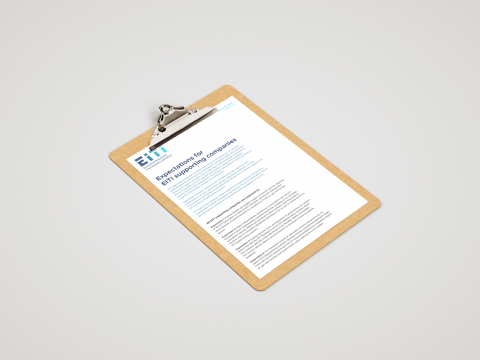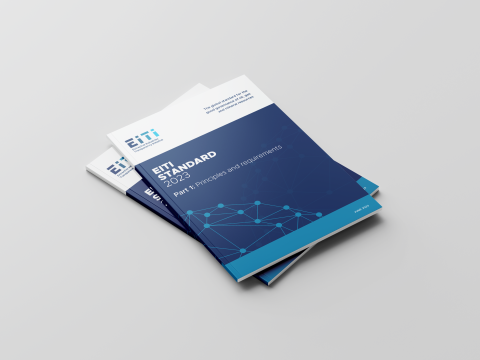
Sustainable debt or pending threat? Shedding light on resource-backed loans
Perspectives from government, industry and civil society
For countries with limited access to credit or capital markets, resource-backed loans are a way of raising funds for infrastructure and development projects. These loans are negotiated by governments or government-owned companies against future production of a country’s natural resources.
The sustainability of such agreements is hotly debated. The latest EITI “Transparency Matters” webinar explored the opportunities and challenges that resource-backed loans pose for resource-rich countries. Moderated by Financial Times Natural Resource Editor Neil Hume, it presented diverse perspectives, including government, civil society and a leading trading company that acts as a counterparty for these loans.
There is broad consensus on a need for greater transparency of the terms of agreements. To pursue this objective, governments, industry, trading companies and civil society have worked together in the EITI’s Working Group on Transparency in Commodity Trading since 2015. The working group is finalising new guidelines for companies buying commodities from governments or state-owned enterprises – the first guidance of its kind for the EITI. The guidelines aim to give consistency to reporting and to encourage more companies to embrace a transparent approach.
Opportunities: An economic boost?
Trafigura, one of the world’s largest commodity traders, has become one of the leading firms engaged in structured pre-payments deals. In 2019, the company issued over USD 5 billion in resource-backed loans. The value of its pre-payments has increased more than 600% since 2012, indicating the growing popularity of such deals.
According to Trafigura’s Chief Financial Officer, Christophe Salmon, pre-payment arrangements are advantageous to governments because they can provide producers with access to finance on far keener terms than they could command directly. For some countries, they may be the only channel available to raise liquidity. As they are granted in US dollars, resource-backed loans can be especially attractive for emerging market economies with weaker currencies. They can also be used by state-owned companies, to fund capital expenditures or improve working capital cycles.
Speaking from a government perspective, Hon. Zainab Ahmed, Minister of Finance and Planning in Nigeria, highlighted that while the Nigerian government has not previously borrowed using resource-backed loans, it may consider this option to provide liquidity in its economy. “But we have to make sure that it’s carefully designed and structured,” said Ahmed. “We’re looking at examples of how it has worked in other countries.” She emphasised that, in response to the sudden decline in revenues brought about by the Covid-19 crisis, pre-payment deals can help resource-dependent nations access cash to meet urgent healthcare or social needs.
Risks: An unmanageable liability?
Commodity price volatility poses a major challenge for governments entering pre-payment deals. For deals based on the value rather the volume of a given commodity, price crashes can mean that a country would need to produce more to repay their loan.
Minister Ahmed echoed this concern. To reduce the impact of oil price volatility, Ahmed noted that these agreements need to be supported by a “de-risking mechanism”, for example insurance, guarantees and openness about the risks involved.
Anne Fishman, representing the research, advocacy and campaigning group, Public Eye, emphasised that pre-payments often carry high fees and interest rates. These can aggravate the debt burden of poorer countries, especially when commodity prices drop. This can deprive a population from revenues needed for education or healthcare. She added that some borrowing countries pledge assets, such as resource reserves, as collateral. “This further exacerbates the dependency to creditors, whose access to the resource will be guaranteed,” said Fishman.
“To limit an accumulation of unsustainable debt, it’s important for loan agreements to include clauses that ensure borrowers are protected under specific scenarios, such as oil price shifts or other special circumstances such as Covid-19,” added Fishman.
Salmon highlighted that some financial lenders propose hedging solutions to mitigate volatility risks. In times of crisis – such as the commodity price drops of 2015 and 2020 – lenders may need to renegotiate repayment schedules to keep the arrangement current. A further risk is production shortfalls or, in worst case scenarios, the halting of operations altogether.
The role of transparency
Fishman stressed that information on resource-backed loans is often not made public, making it difficult to compare data and understand whether terms represent a good deal for citizens. “More oversight is urgently needed,” she said. “The structure of these loans can really affect public revenues, so it is essential to know as much as possible about the contractual conditions.” She urged for more transparency, notably on the interest rates, fees, repayment schedules and restructuring terms as well as the parties to agreements.
Minister Ahmed emphasised that, to curb the risks of price volatility, transparency of the production volumes used to service the loan is critical. She stressed that if Nigeria were to pursue such an agreement, “we would have to put in place a framework that shows visibility of the volumes that are lifted.” Online during the event, the Managing Director of the Nigerian National Petroleum Corporation committed to publishing the terms of a recent crude oil prepayment of approximately USD 1 billion.
Salmon underscored that Trafigura is committed to providing more transparency in the natural resource sector, not only on the matter of resource-backed loans. He noted, however, that transparency of such deals also depends on the willingness of the borrower. He added that Trafigura has been encouraging more countries to join the EITI and invites other trading firms to “join the club”, including those from Asia.
Fishman noted that much progress has been made in recent years. “The EITI is doing a very important job in bringing together all stakeholders and preparing guidance to bring more transparency in this area,” she said.
“But high disclosure requirements are not enough – we need accountability,” said Fishman. She stressed that accountability can be achieved only through regulatory requirements and due diligence obligations for lenders, these being critical to make sure that debt is sustainable for countries.
The Transparency Matters seminar series gathers high-level speakers from government, industry, civil society, financial institutions and development partners to discuss and debate some of the most pressing issues in the extractives industry transparency space. For information on past and scheduled seminars, visit eiti.org/events.




